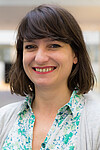Dr. Mariana Astiz

Institut für Neurobiologie
Marie-Curie-Straße
23562 Lübeck
Gebäude CBBM, 1.OG,
Raum 011
| Email: | m.astiz(at)uni-luebeck.de |
| Phone: | +49 451 3101 4302 |
| Fax: | +49 451 3101 4304 |
Education
| Diploma in Biochemistry | Universidad Nacional del Sur | AR |
| PhD in Medical Sciences | Universidad Nacional de La Plata | AR |
Academic Positions
| Postdoctoral Fellow | National Scientific and Technical Research Council (CONICET), La Plata | AR |
| Lecturer in Biochemistry and Molecular Biology | Universidad Nacional de La Plata | AR |
| Postdoctoral Researcher from Spanish National Research Council (CSIC) | Cajal Institute, Madrid | ES |
| Assistant Researcher | National Scientific and Technical Research Council (CONICET), La Plata | AR |
| Research Associate | Unviersity of Lübeck | DE |
Research Interest
From the very beginning of my research career I felt extremely curious about biochemical aspects of the nervous system, especially in relation to the environment. More recently, I have become particularly interested in pregnancy and how the environment, so early in life, is able to shape the offspring's brain functions in the long-term.
The circadian system regulates many aspects of mammalian physiology and behavior, and pregnancy is not an exception. However, while the impact of the environment in the adult circadian system is relatively well described, little is known about the maternal circadian adaptations to pregnancy and whether the maternal and embryonic clocks somehow communicate with one-another to coordinate the dynamic and complex process of development. Recent studies have shown that maternal circadian perturbations such as mistimed stress and sleep have negative consequences on the offspring's health.
In this context, I am using several in vitro and in vivo approaches to understand the feto-maternal communication under stressful conditions at different times of day and its long-term consequences. My final aim is to identify molecular mechanisms responsible for prenatal programming in order to prevent or even reverse the offspring's vulnerability later in life.
Our institute welcomes students from all levels to join and contribute to the progress of this exciting field of research.
Funding
| 2021-2022 | Career development grant 2020, ISN | International Society for Neurochemistry |
| 2018-2021 | Research grant (AS547/1-1), DFG | Deutsche Forschungsgemeinschaft |
| 2016-2018 | Postdoctoral research fellowship IBRO-ISN | International Brain Research Organization-International Society for Neurochemistry |
| 2015 | Postdoctoral short-term fellowship EMBO | European Molecular Biology Organization |
| 2015-2016 | Young Researcher Grant (PICT 1549-2014) AGENCIA | Agencia Nacional de Promocion Cientifica y Tecnica), Argentina |














